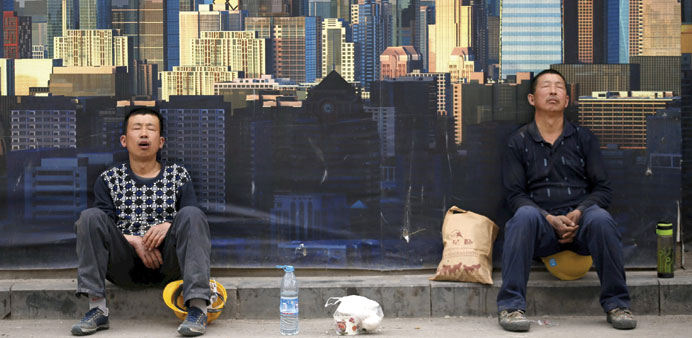Construction workers take a nap in front of a wall of a construction site during their lunch break in Beijing yesterday. A spike in unemployment is always a concern for China’s stability-obsessed government, especially with 7.5mn university graduates estimated to join the labour market this year.
Reuters/Beijing
As growth in China’s sagging economy looks on the verge of spilling below 7%, officials worried about a spike in unemployment are pulling out all the stops to avoid mass lay-offs.
State firms are encouraged to keep idle workers employed, subsidies and tax breaks are given to companies that do not fire their workers, and some businesses are even enticed into hiring despite the slackening economic growth.
The measures appear to be working for now, said a senior economist at the Development Research Centre, a think tank affiliated to China’s cabinet.
“There is no big problem in employment. They (top leaders) are more worried about financial risks and debt risks,” said the economist, who declined to be named.
But things could change quickly.
In one of the first signs of distress in China’s labour market, the Liaoning government said in April it had slashed its 2015 job creation target to 400,000 from 700,000, to reflect a “severe” employment trend.
That came in the wake of data that showed Liaoning, one of three rustbelt provinces in northeastern China, grew just 1.9% in the first three months of the year, the slowest of China’s 31 provinces and regions.
Disappearing job opportunities or a spike in unemployment are always a concern for China’s stability-obsessed government, especially with 7.5mn university graduates estimated to join the labour market this year.
A rise in the jobless rate could spur government to stronger policy action to cushion the world’s second-largest economy from what will this year be its slowest growth in a quarter of a century.
“As long as we can prevent people from losing their jobs and prevent social unrest, we should raise salaries and provide social security and pensions,” said a researcher at China’s powerful economic planner, the National Development and Reform Commission.
In the first quarter, when growth slipped to 7%, the official unemployment rate barely budged.

